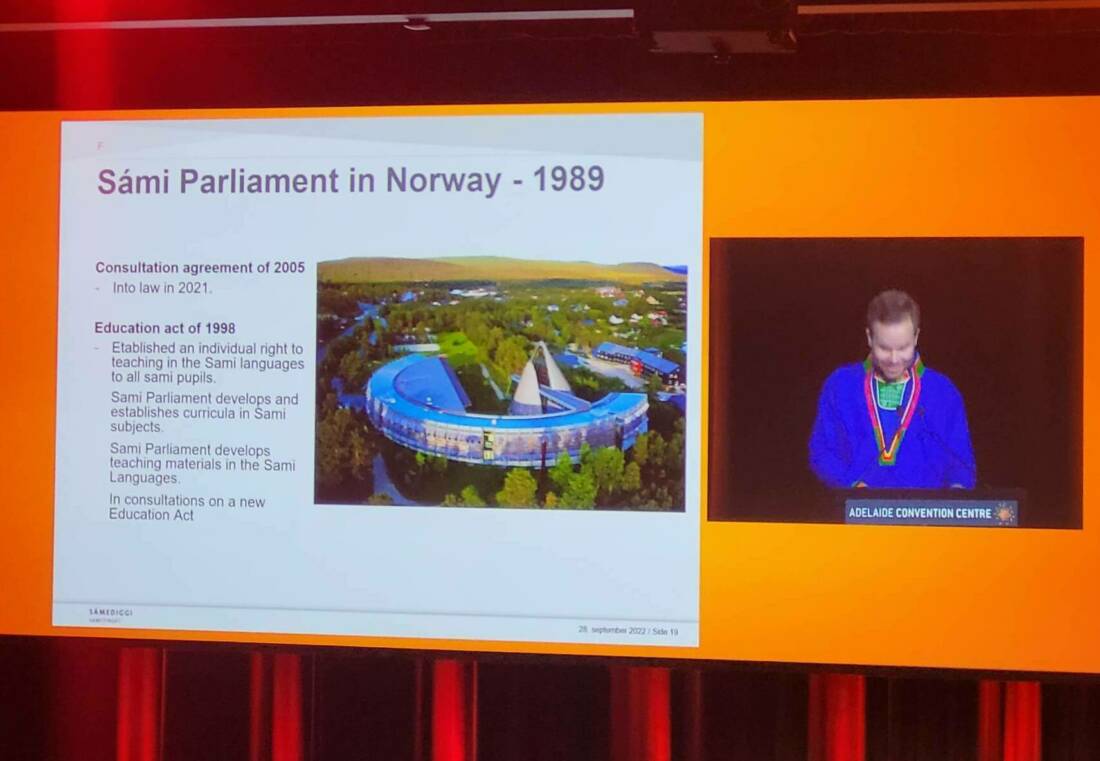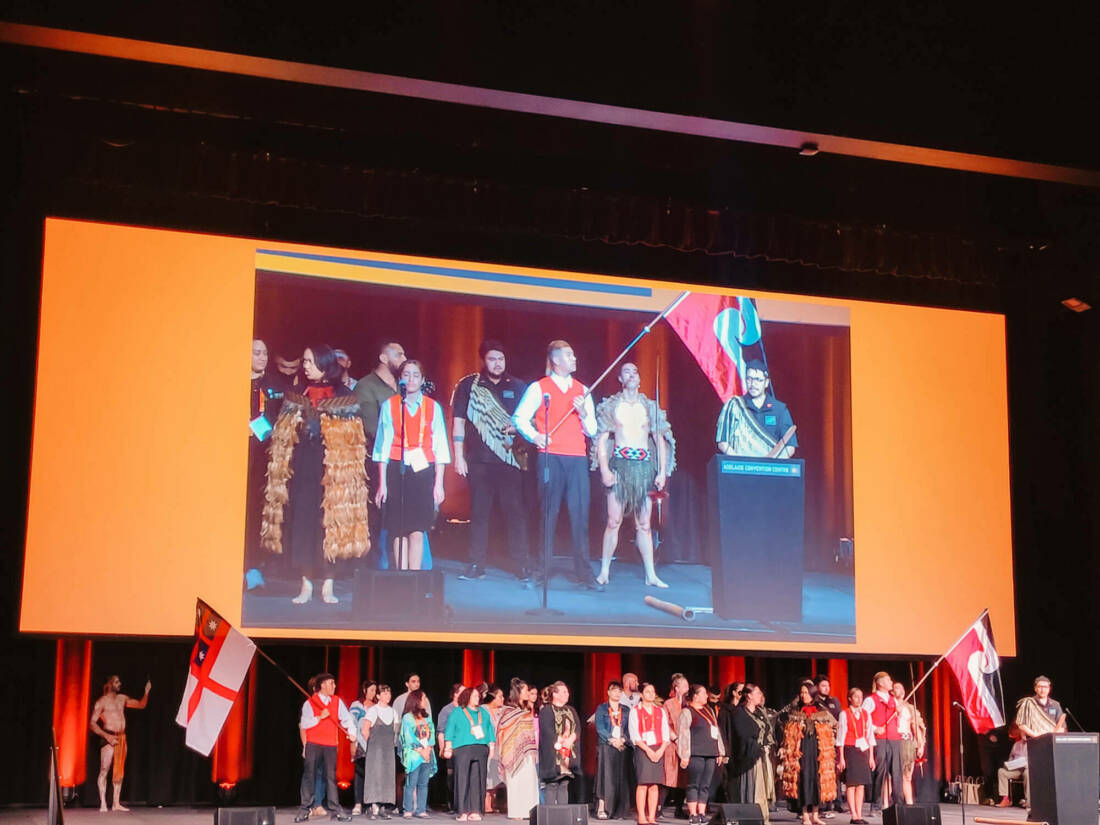2022 World Indigenous Peoples Conference on Education
In September UNESCO Aotearoa Youth Leader Adriana Bird attended the 2022 World Indigenous Peoples Conference on Education (WIPCE). Below she reflects on her experience.
Adriana Reflects
In the last week of September, I had the privilege of attending the 2022 World Indigenous Peoples Conference on Education (WIPCE). Held on the lands of the Kaurna nation, the original people of the Adelaide plains, WIPCE brought together indigenous representatives from across the globe to share successes and strategies for culturally grounded education; addressing the fundamental challenge of reconciling their own culturally transmitted learning within western systems of formal education.
Despite indigenous knowledge systems being better recognised as crucial for sustainable development, the social, economic, and political marginalisation of indigenous peoples globally persists. Throughout the week I was able to connect with delegates and listen to countless academics, historians, story tellers and changemakers dedicating their minds to the indigenous education movement.
The biggest challenge I found from the WIPCE conference was being spoilt for choice. Each day the programme consisted of two plenary sessions and five workshop sessions in which up to 16 workshops ran concurrently, followed by multiple different performances in the evening. It was overwhelming to say the least but puts into perspective the scale of this event and the scale of the global movement. Below are just a few of the key learnings, stories, and messages I took away from the week.

Pictured above (left) is filmmaker Rachel Perkins. On the second evening, WIPCE hosted the premiere screening of the final episode in her three-part docuseries on the Australian Wars. The series provides a brutally honest recount of one of the most violent colonial takeovers in the world. Between the sobs, I took away the following powerful messages:
- History is written by the victors
- The oral nature of indigenous record-keeping leaves us vulnerable to colonial “gaslighting”, and
- Having an accurate knowledge of a country’s history will enable non-indigenous people to be better allies and understand the need for treaties, reconciliation, and equity.
Following the screening, Rachel discussed the purpose of this series to bring awareness and education to the Australian Wars, noting that it is seldom recognised as such, despite possessing all the markings as the most influential war in Australia’s history.
The need to reclaim the accurate history of colonial societies is one we face here in Aotearoa too. This was one of the many connections I reflected on during the various sessions. Another clear connection was the movement of indigenous language revitalisation.
Mikkel Mikkelsen spoke to the way language, culture, and land are intrinsically linked to identity. He shared with us his experience of fighting to preserve them. Mikkel is a member of the Norwegian Sāmi Parliament – Sāmi are indigenous people to Lapland (which now makes up the northern parts of modern-day Scandinavia and Russia). There are ten distinct Sāmi languages, all at a high degree of endangerment. Like Te Reo, the loss of Sāmi languages was a direct result of historic laws and policies that prohibited their use in schools and homes. Mikkel gave a powerful and emotional speech about the constant struggle of language revitalisation, quoting Professor Leena Huss – “Maybe it’s time for us all to understand that revitalisation is just that, a struggle – sometimes onerous and frustrating, often healing and empowering – but still a struggle, without end in sight.”

This was a sentiment shared by many of the delegates in connection to their own language revitalisation journeys back home. Further connections came in the form of shared struggles of revitalising indigenous education in a western system.
Dr Pania Te Maro discussed the limitations on te kura kaupapa in Aotearoa within the confines of a western society. Focusing on mathematics, Dr Te Maro’s research highlights the need for an indigenous accreditation scheme to better enable Kaupapa and mātauranga Māori in kura.
At the tertiary level, Aileen Moreton-Robinson spoke to intellectual indigenous sovereignty and noted that there is still disregard for its worth within academia. Many of the current indigenous study programmes are tied to reconciliation obligations and aren’t held to the same intellectual level as other study areas. Within the indigenous studies ambit, Aileen applied a critical lens, making a clear distinction between western anthropological studies of indigenous peoples and indigenous studies as its own sovereign knowledge base. She referenced the historical use of western anthropology to affirm a hierarchy of humanness and validate colonial practices and power. A key example within the Australian context was how this was used to validate government policy and direction that led to the countless number of Aboriginal and Torres Strait islander children who were forcibly removed from their families.
As an Eastern Arrente woman and a Stolen Generation survivor, Dr Jennifer Caruso discussed the interaction between state and academia (particularly anthropology) in the setting up of Half-Caste Children’s Missions like the one she was taken to on Croker Island. Dr Caruso explained how the notions of power of “being white” and deficits of “being Aboriginal” provided the rationale for the government to claim that they were saving “mixed blood”, “white passing” and “half-caste” Aboriginal children from a life of neglect.
On top of brilliant academics like Dr Caruso who are dismantling colonial histories, WIPCE displayed the countless innovators in education across the globe who are creating spaces, strategies, and tools to empower indigenous communities to reclaim their knowledge and identity. From digital culture hubs in Western Australia designed to protect the intellectual property of indigenous knowledge, to school lunch programmes in Hawaii that combine food nutrition and cultural revitalisation, it was inspiring to see the various solutions based in indigenous ways of thinking and connecting.

